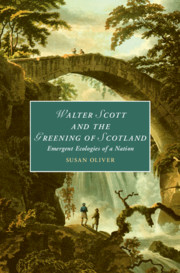Book contents
- Walter Scott and the Greening of Scotland
- Cambridge Studies in Romanticism
- Walter Scott and the Greening of Scotland
- Copyright page
- Dedication
- Contents
- Illustrations
- Acknowledgements
- Chronology of Works Referenced
- Chapter 1 Introduction
- Chapter 2 Shifting Ecologies
- Chapter 3 Toxic Ecologies, Ecogothic and Violence against the Land
- Chapter 4 Wild Places, Rarity and Extinction
- Chapter 5 Trees
- Chapter 6 Stone, Water, Air
- Notes
- Bibliography
- Index
- Cambridge Studies in Romanticism
Chapter 2 - Shifting Ecologies
Grasslands, Rivers and Shorelines
Published online by Cambridge University Press: 30 July 2021
- Walter Scott and the Greening of Scotland
- Cambridge Studies in Romanticism
- Walter Scott and the Greening of Scotland
- Copyright page
- Dedication
- Contents
- Illustrations
- Acknowledgements
- Chronology of Works Referenced
- Chapter 1 Introduction
- Chapter 2 Shifting Ecologies
- Chapter 3 Toxic Ecologies, Ecogothic and Violence against the Land
- Chapter 4 Wild Places, Rarity and Extinction
- Chapter 5 Trees
- Chapter 6 Stone, Water, Air
- Notes
- Bibliography
- Index
- Cambridge Studies in Romanticism
Summary
This chapter explores Scott’s writing about familiar landscapes comprising cultivated land, rivers and coastlines. Topics include the history of farming and effects of new agricultural policies associated with enlightenment and the culture of ‘improvement’. The expansion of sheep farming is discussed with attention to changes in soil structure, flora and rural population levels. Sections address foods that are associated with Scotland, including salmon, beef and mutton. Whisky is explored for its ecological and national significance. River and offshore environments are considered in terms of the use of marine products and technologies that threatened fish stocks. The chapter has a temporal framework that looks from the nineteenth century back to the end of the last great ice age, exploring Scott’s interest in environmental history through his accounts of fossils, prehistoric tools and animal bones found in peat bogs. Environmental memory, folklore, supernatural creatures and eco-gothic tropes of haunting are key themes.
- Type
- Chapter
- Information
- Walter Scott and the Greening of ScotlandEmergent Ecologies of a Nation, pp. 28 - 63Publisher: Cambridge University PressPrint publication year: 2021

